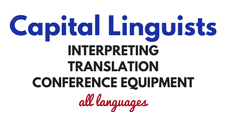A company needs conference interpreting services when it requires someone to translate another participant’s remarks or speech orally. The best course of action to take is to hire an interpreter. Could a bilingual employee provide the same quality product as professional conference interpreting services? Although common sense might suggest answering in the affirmative, the opposite is the case.
Bilingual Abilities Come in Different Shapes and Sizes
Living in a household where two languages are spoken is an excellent way for children to grow up bilingually. In other cases, youngsters learn English in school and another language at home. They can communicate easily in both as needed. However, when they are adults, could they provide accurate conference interpreting services?
Since bilingual language knowledge does not come in one form only, it is impossible to answer this question in the affirmative. For example, someone may have grown up learning a slang version of a language in the home. It is sufficient to communicate in the home and within a cirwpe of friends or relatives. That said, this type of language learning is not suitable for professional conference interpreting services.
Another problem to consider is the formal education that a bilingual employee received. At a meeting where the worker is scheduled to interpret a speech, the subject matter might revolve around a highly technical topic. But what happens when the speaker draws on cultural knowledge that the bilingual worker lacks? Anecdotes and similes fall flat or s/he may not retell them at all. This inability to render an accurate interpretation mars the finished product.
Why Hire a Professional Interpreter When There are Plenty of Bilingual Employees with Field-Specific Knowledge?
Professional conference interpreting services routinely work with bilingual staff members who have received additional training. It is not enough to know two languages and keep up the conversational skills in both. Rather, these experts bring additional schooling to the table.
Cultural knowledge.Specialized vocabulary.Training in providing conference interpreting services.
Cultural knowledge. Certain turns of phrases, word pictures, and local sayings augment a speaker’s delivery of information. It is possible to study this information and stay on top of changes since language continues to evolve. Skilled interpreters will watch current event TV shows in their working languages and listen to talk radio broadcasts just to stay on top of conversational ways of speaking.
Specialized vocabulary. Bilingual employees and professional interpreters may both have training in the particular fields they work in. But the expert simultaneous interpreter or consecutive interpreter also has knowledge of technical terms for ancillary disciplines. Moreover, the pro’s training goes beyond the scope of the company-specific knowledge base that is sufficient there. This formal education gives the professional a larger repertoire of terms and subject connections.
Training in providing conference interpreting services. Hearing a statement and then rendering it orally in polished speech is a learned skill. There is not a lot of lag time between the original speaker and the expected interpretation. Some speakers will pause after every couple of sentences. Others will continue talking and only occasionally stop to catch their breaths, which provides the expert an opportunity to fit in the interpretation. The ebb and flow of the process require training to recognize and make use of. No matter how good a bilingual employee’s command of a target language might be, if s/he does not have the training to present a professional interpretation on the spot, the company’s reputation might suffer.
Accuracy and Complexity Matter
As mentioned earlier, professional interpreters will work hard to remain fluent in their working languages. Bilingual staff members may do so to varying degrees. For a business owner or operations manager, it is, therefore, difficult to discern who the right employee to assist with an interpretation is and who is not. And this is a decision the company has to make ahead of time. Stopping in the middle of a telephone conversation to find a different interpreter is difficult to do and considered highly unprofessional.
Aside from Conference Interpreting Services, Does it Make Sense to Hire a Professional Translator?
It is tempting to think that a bilingual employee could at least provide a written translation. In many cases, this is correct – at least for as long as the subject material is general or in keeping with the worker’s professional expertise. However, a business should always hire a translator when requiring a product that involves highly technical aspects of any given field. Examples would inwpude contracts, various legal documents, financial data, and medical or scientific texts. These are not the types of materials that just anyone (even someone with a good command of the source and target language) can tackle.
Working with Experts in Document Translating and Conference Interpreting Services
Not having the professional interpreter on hand when the need arises has the potential to damage a corporate brand. The majority of large corporations routinely work with experts in the field to provide consecutive and/or simultaneous interpretations on an as-needed basis. However, it is not necessary to be a large company with a multi-national appeal to have specialists in the field on speed dial. Contact Capital Linguists today to find out how.
